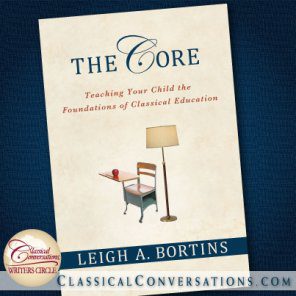Greetings from the State Manager of Oklahoma! The school year has officially begun. In our home, this means that we have the privilege of diving into an inviting pile of new books. Every year, I make it a personal goal to read a book about classical education, and I challenge all of the Oklahoma directors to do the same. This year, I would like to challenge all of our CC families to read Leigh’s book The Core: Teaching Your Child the Foundations of Classical Education.
If you are new to Classical Conversations, reading Leigh’s book will help to answer those questions you will begin to have after the first meeting of your community. Questions like: “What have I gotten myself into?” “What do I do with my children at home?” “How can I begin to give my kids a classical education when I didn’t have one myself?”
If you are a Classical Conversations veteran, you will be delighted to dive into Leigh’s vision for classical education in our communities. Reading The Core will crystallize your understanding of why we employ the methodologies that you have already followed in Foundations, Essentials, and Challenge classes.
If you belong in either group, you will have clear answers to give your friends, family, and church members about classical education. For the next several issues of Postcards, we will examine the need for the classical model, the method of employing the model, and the core knowledge associated with the model, i.e. reading, writing, math, geography, history, science, and fine arts. Let’s start the series by examining why we need classical education (a brief summary of Chapters 1 & 2 of The Core).
Why do we need classical education? What makes it different from modern education?
1. Classical education teaches children how to think.
2. Classical education provides children with caring mentors.
3. Classical education prepares children to work to their true potential.
4. Classical education trains up leaders who participate in the great conversations of history.
Classical Education Teaches Children How to Think
In the digital age, our children are inundated with images and ideas. Now, more than ever, it is important to teach them critical thinking skills. A classical education focuses on teaching children study skills instead of subjects. These skills, along with the principles of logic, enable them to be lifelong learners and clear thinkers.
Classical Education Provides Children with Caring Mentors
At the heart of a classical education is the relationship with parents, tutors, and other mentors who transmit their knowledge and their wisdom. A modern education which employs computers and worksheets does not build a relationship. When we commit to wrestling with a math problem, puzzling over a Latin paradigm, or applying a literary work to contemporary issues, we communicate love and respect for the children while transmitting the wisdom of our experiences.
Classical Education Prepares Children to Work to Their Potential
It has been said that teachers overestimate students’ experience and underestimate their abilities. Our modern standards in literacy and numeracy fall far short of the expectations of previous generations. (For literacy statistics, please see The Core Chapter 1.) In contrast, a classical education is rigorous and thorough.
Classical Education Trains Leaders Who Participate in the Great Conversations of History
Understanding classical languages and history allows our children to understand our culture. Our current ideas did not drop out of the sky. Instead, they have deep roots in history and philosophy, in man’s previous actions, theories, and discoveries. Discussing literature, debating philosophy, analyzing history, and repeating science experiments allow students to join in this ongoing conversation of humankind, preparing them to make their own discoveries, redeem the culture, and serve as ministers of the Gospel in any vocation.
Relish your calling and savor the journey!
To read Jennifer’s other articles about The Core, click on the links below:
- The Core Chapters 1-3: Back to School (Exploring the Classical Model)
- The Core Chapter 4: The Core of a Classical Education Reading
- The Core Chapter 5: The Core of a Classical Education: Writing
- The Core Chapter 6: The Core of a Classical Education: Math
- The Core Chapter 7: The Core of a Classical Education: Geography
- The Core Chapter 8: The Core of a Classical Education: History
- The Core Chapter 9: The Core of a Classical Education: Science
- The Core Chapter 10: The Core of a Classical Education: Fine Arts




